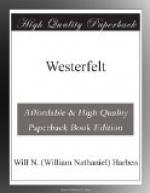“Yore affectionate father,
“JOHN WAMBUSH.”
Westerfelt folded the letter deliberately, and then in a sudden spasm of jealous despair he crumpled it in his hand. He turned his head on the side and pressed down his pillow that he might see Harriet as she sat by the fire. The red firelight shone in her face. She looked tired and troubled.
“Poor girl!” he murmured. “Poor girl! Oh, God, have mercy on me! She loves him—she loves him!”
She looked up and caught his eyes. “Did you want anything?” she asked.
He gave the letter to her. “Burn it, please. I wish I had not read it.”
She took it to the fire. The light of the blazing paper flashed on the walls, and then went out.
He remained so silent that she thought he was sleeping, but when she rose to leave the room she caught his glance, so full of dumb misery that her heart sank. She went to her mother in the kitchen. Mrs. Floyd was polishing a pile of knives and forks, and did not look up until Harriet spoke.
“Mother,” she said, “I am afraid something has gone wrong with Mr. Westerfelt.”
“What do you mean?” asked the old lady in alarm.
“I don’t know, but he got a letter this morning, and after he read it he seemed changed and out of heart. He gave it to me to burn, and I never saw such a desperate look on a human face. I know it was the letter, because before he read it he was so—so different.”
“Well,” said Mrs. Floyd, “it may be only some business matter that’s troubling him. Men have all sorts of things to worry about. As for me, I’ve made a discovery, Harriet, at least I think I have.”
“Why, mother!”
Mrs. Floyd put the knives and forks into the knife-box.




